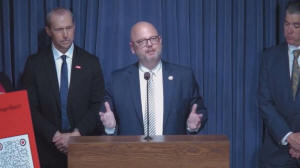|
“Illinoisans know well that we shoulder the highest overall tax
burden of any state in the nation,” said state Rep. Jeff Keicher,
R-Sycamore. “That crushing tax burden has been driving families,
seniors and businesses out of our state for years.”
A recent study placed Illinois last in the country for taxation,
coming in at 51st for overall effective state and local tax
rate, 50th for real estate taxes, and 47th for income taxes.
“With tax day right around the corner, Illinois families are
feeling the strain of a bloated tax burden and a poor job
market,” said state Rep. Jackie Haas, R-Kankakee. “Hardworking
men and women are the ones who will suffer the most if we don’t
get our house in order and start focusing on passing good public
policy to make it easier to live in Illinois.”
At 1.95%, the average property tax rate in Illinois is the
second highest in the country, according to the Tax Foundation.
Property taxes vary by municipality, but northeastern Illinois,
including Chicago, has significantly higher property taxes than
the rest of the state. Lake County has the highest median
property taxes paid at $8,609, according to 2022 data from the
Tax Foundation, while Pulaski County near the Kentucky border
has the lowest at $694.
State Rep. Joe Sosnowski, R-Rockford, takes issue with the
priorities of the Pritzker administration, such as the spending
on undocumented immigrants.
“We’ll spend billions of Illinois taxpayer dollars on people who
are not residents of Illinois to give them free health care,”
said Sosnowski. “No premiums, no co-pays, no cost out of pocket
whatsoever.”
The 104th General Assembly continues through the end of May. |
|




